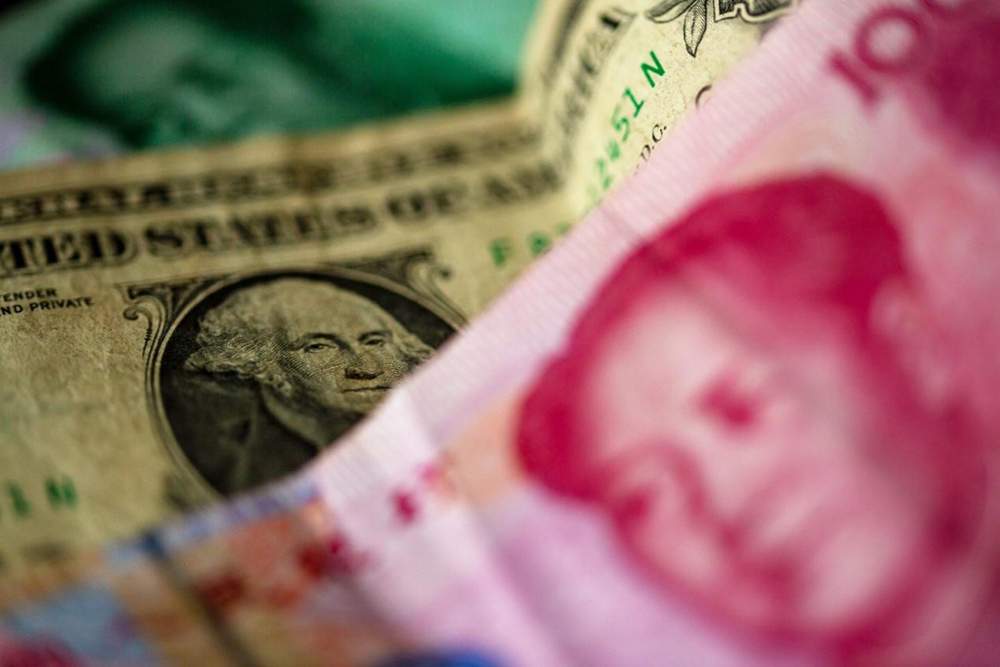
一位知名经济学家警告,美元的影响力开始下降,人民币的崛起动摇了美元的全球主导地位。
标准普尔全球评级(S&P Global Ratings)的首席经济学家保罗·格伦瓦尔德在该评级机构于英国伦敦举行的一次活动上发言,警告美元“强势不再”。
据路透社(Reuters)报道,格伦瓦尔德称他开始看到美元这种全球最具影响力的货币“正在从边缘开始出现裂痕”,他还表示“在非美元世界有事情正在发生”。
格伦瓦尔德的证据包括目前以人民币结算的交易量。今年3月,人民币首次超过美元,成为中国跨境交易使用最广泛的货币。
格伦瓦尔德还强调,亚洲基础设施投资银行(Asia Infrastructure Investment Bank)和新开发银行(New Development Bank,原金砖银行)等银行,正在增加全球借贷,这进一步提高了人民币的地位。
俄罗斯的问题
美元面临的另外一个严峻的问题是俄罗斯。
随着俄乌冲突的爆发,美国对俄罗斯的经济制裁使其转向了人民币。
据彭博社(Bloomberg)报道,自2月以来,随着中俄两国建立更加紧密的政治联盟,莫斯科交易所(Moscow Exchange)的每月交易量主要以人民币而不是美元结算。
格伦瓦尔德还表示:“美元依旧是领先的全球货币,但它不再是占据主导地位的全球货币。”
这位标准普尔的专家并非率先提出这种理论的第一人。
上周,诺贝尔奖得主、经济学家保罗·克鲁格曼在《纽约时报》(New York Times)撰文称:“美元的主导地位不可能永久存在,因为没有任何事情是永恒的。”
然而,他对去美元化即将来临的担忧不屑一顾,他表示这种心态“纯属小题大做”。所谓去美元化是指美元在全球贸易和融资活动中的主导地位下降。
他在文章的最后说:“目前,美元依旧占据主导地位,因为没有任何好的替代选择。”
美元依旧占据主导地位
来自美联储(Federal Reserve)的数据似乎证实了克鲁格曼的说法。
在6月发布的报告中,美联储指出,1999年至2019年,在美洲以美元结算的贸易额占比高达96%,在亚太地区占74%,在其他地区占79%。
报告称:“虽然在过去20年,使用人民币跨国结算的数量增多,但它依旧低于日元和英镑。”
武器化
反对美元的一个主要因素是美元被用作对付俄罗斯的武器。
到目前为止,美国对俄罗斯的制裁包括冻结俄罗斯使用一半外汇储备的能力,并且禁止俄罗斯使用交易入口SWIFT。
4月,美国财政部部长珍妮特·耶伦告诉美国有线电视新闻网(CNN):“我们使用的金融制裁与美元的地位相关联,可能带来的风险是美元霸权将被动摇。”
耶伦指出,美元被“审慎地”作为一种工具,她还表示“这是一种非常有效的工具。当然,这确实会让中国、俄罗斯、伊朗等产生寻找一种替代货币的渴望。”
国际货币基金组织(IMF)的第一副行长吉塔·古皮纳斯表达了类似的担忧。特斯拉(Tesla)的首席执行官埃隆·马斯克也担心美元武器化的影响。
在4月,推特(Twitter)的老板对一条声称“去美元化正在快速发生”的视频做出回应。
太空探索技术公司(SpaceX)的创始人回应道:“如果你过于频繁地将美元武器化,其他国家就将停止使用它。”
无论美元是否被武器化,其他国家都在想方设法绕开美元。
今年4月,巴西总统路易斯·伊纳西奥·卢拉·达席尔瓦在访华途中问到:“为什么每个国家的贸易都要与美元挂钩?……是谁决定了美元是(全球的)货币?”
他继续说道:“为什么像金砖银行这样的银行,不能有一种货币,为巴西与中国之间、巴西与其他金砖国家之间的贸易提供资金?……今天,各国明明可以用本国货币进行出口结算,却不得不继续使用美元。”(财富中文网)
译者:刘进龙
审校:汪皓
一位知名经济学家警告,美元的影响力开始下降,人民币的崛起动摇了美元的全球主导地位。
标准普尔全球评级(S&P Global Ratings)的首席经济学家保罗·格伦瓦尔德在该评级机构于英国伦敦举行的一次活动上发言,警告美元“强势不再”。
据路透社(Reuters)报道,格伦瓦尔德称他开始看到美元这种全球最具影响力的货币“正在从边缘开始出现裂痕”,他还表示“在非美元世界有事情正在发生”。
格伦瓦尔德的证据包括目前以人民币结算的交易量。今年3月,人民币首次超过美元,成为中国跨境交易使用最广泛的货币。
格伦瓦尔德还强调,亚洲基础设施投资银行(Asia Infrastructure Investment Bank)和新开发银行(New Development Bank,原金砖银行)等银行,正在增加全球借贷,这进一步提高了人民币的地位。
俄罗斯的问题
美元面临的另外一个严峻的问题是俄罗斯。
随着俄乌冲突的爆发,美国对俄罗斯的经济制裁使其转向了人民币。
据彭博社(Bloomberg)报道,自2月以来,随着中俄两国建立更加紧密的政治联盟,莫斯科交易所(Moscow Exchange)的每月交易量主要以人民币而不是美元结算。
格伦瓦尔德还表示:“美元依旧是领先的全球货币,但它不再是占据主导地位的全球货币。”
这位标准普尔的专家并非率先提出这种理论的第一人。
上周,诺贝尔奖得主、经济学家保罗·克鲁格曼在《纽约时报》(New York Times)撰文称:“美元的主导地位不可能永久存在,因为没有任何事情是永恒的。”
然而,他对去美元化即将来临的担忧不屑一顾,他表示这种心态“纯属小题大做”。所谓去美元化是指美元在全球贸易和融资活动中的主导地位下降。
他在文章的最后说:“目前,美元依旧占据主导地位,因为没有任何好的替代选择。”
美元依旧占据主导地位
来自美联储(Federal Reserve)的数据似乎证实了克鲁格曼的说法。
在6月发布的报告中,美联储指出,1999年至2019年,在美洲以美元结算的贸易额占比高达96%,在亚太地区占74%,在其他地区占79%。
报告称:“虽然在过去20年,使用人民币跨国结算的数量增多,但它依旧低于日元和英镑。”
武器化
反对美元的一个主要因素是美元被用作对付俄罗斯的武器。
到目前为止,美国对俄罗斯的制裁包括冻结俄罗斯使用一半外汇储备的能力,并且禁止俄罗斯使用交易入口SWIFT。
4月,美国财政部部长珍妮特·耶伦告诉美国有线电视新闻网(CNN):“我们使用的金融制裁与美元的地位相关联,可能带来的风险是美元霸权将被动摇。”
耶伦指出,美元被“审慎地”作为一种工具,她还表示“这是一种非常有效的工具。当然,这确实会让中国、俄罗斯、伊朗等产生寻找一种替代货币的渴望。”
国际货币基金组织(IMF)的第一副行长吉塔·古皮纳斯表达了类似的担忧。特斯拉(Tesla)的首席执行官埃隆·马斯克也担心美元武器化的影响。
在4月,推特(Twitter)的老板对一条声称“去美元化正在快速发生”的视频做出回应。
太空探索技术公司(SpaceX)的创始人回应道:“如果你过于频繁地将美元武器化,其他国家就将停止使用它。”
无论美元是否被武器化,其他国家都在想方设法绕开美元。
今年4月,巴西总统路易斯·伊纳西奥·卢拉·达席尔瓦在访华途中问到:“为什么每个国家的贸易都要与美元挂钩?……是谁决定了美元是(全球的)货币?”
他继续说道:“为什么像金砖银行这样的银行,不能有一种货币,为巴西与中国之间、巴西与其他金砖国家之间的贸易提供资金?……今天,各国明明可以用本国货币进行出口结算,却不得不继续使用美元。”(财富中文网)
译者:刘进龙
审校:汪皓
The power of the greenback may be beginning to fade and is being pushed down the global pecking order by the rise of the Chinese yuan, a top economist has warned.
Speaking during an S&P Global Ratings event in London, Paul Gruenwald the rating firm’s chief economist, cautioned that the dollar “doesn’t have quite the pull it used to.”
According to a Reuters report, Gruenwald said he was beginning to see “fragmentation around the edges” of the globally influential currency, adding that “things [are] happening outside of the dollar world.”
Gruenwald’s evidence included the number of transactions now being carried out in yuan—overtaking the dollar for the first time in March to become the most widely used currency for cross-border transactions in China.
Likewise, Gruenwald highlighted banks like the Asia Infrastructure Investment Bank and the New Development Bank—formerly known as the BRICs bank—are ramping up global lending, further putting the Chinese currency front and center.
The Russia problem
Another major issue facing the dollar is Russia.
U.S. economic sanctions imposed on the country for its invasion of Ukraine saw the nation turn to the yuan, also referred to as renminbi.
Since February, the monthly trading volumes on Moscow Exchange were predominantly conducted in yuan instead of dollars, Bloomberg reported, with the two nations also forming closer political ties.
“The U.S. (dollar) will continue to be a leading world currency, (but) it will no longer be the dominant world currency,” Gruenwald added.
The S&P expert isn’t the first to voice this theory.
Last week Paul Krugman, a Nobel Laureate and economist, wrote in the New York Times that “the greenback’s dominance won’t last forever, because nothing does.”
However, he brushed off fears that de-dollarization—the reduction of the dominance of the dollar in global trade and financing activities—is imminent, adding it was “much ado about nothing.”
“For now, the dollar dominates because there just aren’t any good alternatives,” he finished.
Dollar still dominates
According to data from the Federal Reserve, that certainly seems to be the case.
In a June release, the Fed pointed out that over the period of 1999 to 2019, the dollar accounted for 96 percent of trade invoicing in the Americas, 74 percent in the Asia-Pacific region, and 79 percent in the rest of the world.
“While international usage of the Chinese renminbi has increased over the past 20 years [it] remains even behind the Japanese yen and British pound,” it adds.
Weaponization
A major factor working against the dollar is its weaponization against Russia.
Sanctions thus far have included freezing Russia’s ability to use half of its reserves as well as hamstringing its access to the transaction portal SWIFT.
In April, Treasury Secretary Janet Yellen told CNN: “There is a risk when we use financial sanctions that are linked to the role of the dollar that over time it could undermine the hegemony of the dollar.”
Yellen caveated that the dollar is used as a tool “judiciously,” adding: “It is a very effective tool. Of course, it does create a desire on the part of China, of Russia, of Iran to find an alternative.”
As well as the IMF’s First Deputy Managing Director, Gita Gopinath, voicing similar concerns, Tesla CEO Elon Musk is also wary of the impact of weaponizing the currency.
In April the Twitter owner responded to a video claiming “de-dollarization is real and is happening fast.”
The SpaceX founder replied: “If you weaponize currency enough times, other countries will stop using it.”
Weaponization or not, other countries are looking into ways to circumnavigate the dollar.
In April, while on a trip to China, Brazilian President Luiz Inacio Lula da Silva asked: “Why should every country have to be tied to the dollar for trade?… Who decided the dollar would be the (world’s) currency?”
Lula da Silva continued: “Why can’t a bank like the BRICS bank have a currency to finance trade between Brazil and China, between Brazil and other BRICS countries?… Today, countries have to chase after dollars to export, when they could be exporting in their own currencies.”






